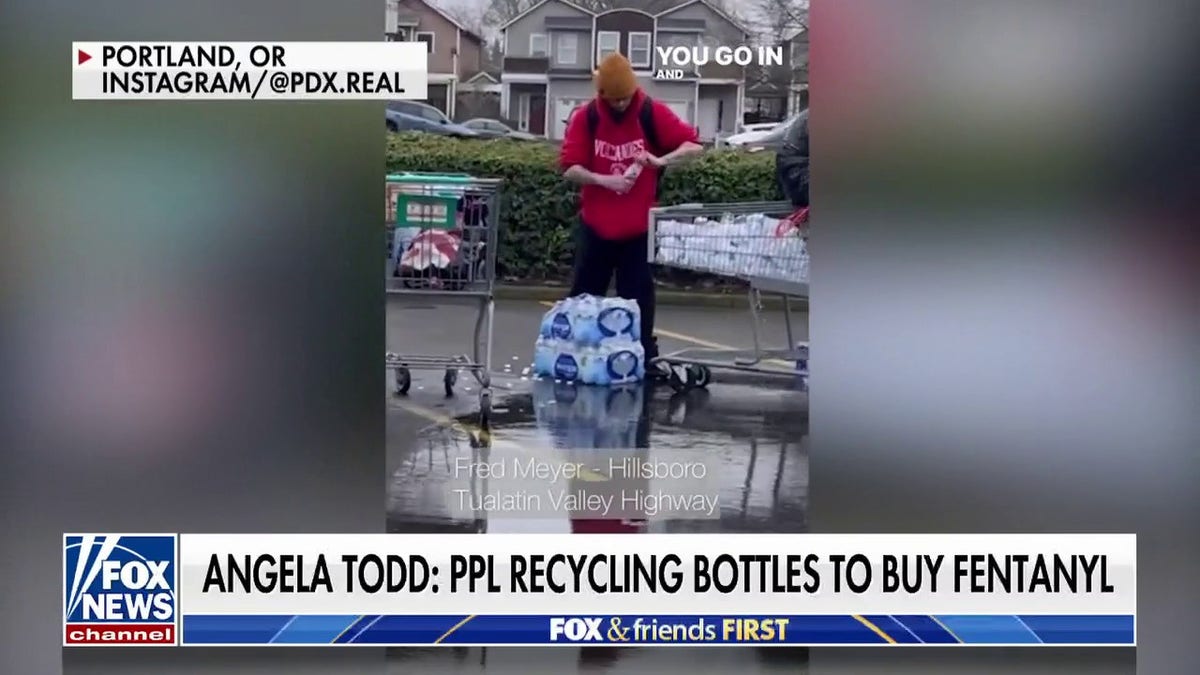Portland resident claims addicts recycling bottles to buy fentanyl
Angela Todd joined 'Fox & Friends First' to discuss how drug addicts are using food stamps to fuel their addiction as fentanyl poisonings continue to climb.
Addicts in Portland are reportedly turning to their food stamps to fuel their drug addiction, recycling bottles to garner cash to buy more fentanyl, all at the expense of the city's taxpayers.
Portland resident Angela Todd released shocking footage showing people on the streets appearing to dump out water bottles shortly before cashing in on the plastic to raise money to buy more drugs.
"People are not using their food debit cards to help for survival skills or diapers or to make ends meet," Todd said during "Fox & Friends First" Tuesday. "They're cashing them in for drugs. It's really it's very sad... The taxpayer dollars are being wasted, and you understand that we're in a situation where we have record overdoses and the state is turning a blind eye to this. This is really awful to allow this to go on."
'OUR CITY IS IN PERIL': PORTLAND BUSINESS OWNERS DEMAND MORE ACTION AS CRIMINALS 'WREAK HAVOC'
Todd noted millions have seen the footage showing the crisis, which she blamed on either "incompetence or corruption," just two years after voters in Oregon decriminalized the possession of all drugs.
"I'd like the politicians to answer us why they are allowing these people to suffer on our streets," Todd said. "And this fentanyl is unbelievably addictive. It's causing psychosis. There's places in Portland that look like a Third World country."

Portland resident Angela Todd claims addicts are using their food stamps to fuel their drug addiction.
"We have people acting like zombies on our streets," she continued. "I can't underscore that enough. There's no exaggeration in what I'm saying."
Oregon became the first state in the country to decriminalize possession of small amounts of hard drugs back in 2020, including heroin, fentanyl, and meth.
PORTLAND’S HOMELESS CRISIS HAS RESIDENTS ‘PICKING SOMEWHERE ELSE’ TO LIVE, REALTY BROKER SAYS
The new law made possession of those substances no more than a Class E violation, the equivalent of a traffic ticket punishable by a maximum $100 fine.
But the fine is dismissed when someone who is fined calls a help hotline, Lines for Life, and completes a health assessment.
With the decriminalization law taking effect, it reallocated hundreds of millions of dollars to addiction-related services, but there is now a push to send a portion of those funds back to police and local governments.
"We have, in fact, made it so personal possession of drugs is legal, so our problem is that we are not prosecuting people and… It's almost like a de facto decriminalization," Todd said. "Our state did not implement the rehab and the mental health that they promised us, and so now they're not being prosecuted, nor are they being forced to go to rehab - so we have this mayhem on our streets."
CLICK HERE TO GET THE FOX NEWS APP
Those in favor of reallocating the millions of dollars funneled to addicts argue local governments should be receiving more of the funding, while critics of the proposal say it could have a devastating impact on the state's drug crisis as it continues to spiral in certain cities.
But the drug crisis is not exclusive to Oregon.
Fentanyl overdoses have soared nationwide in recent years, and according to CDC data, there were more than 73,000 overdoses from the deadly drug just last year.
"We as a community have to come together and look at the fact that our government is literally just giving grants and money, and we're spending our money in really inefficient ways, and people that are doing drugs that are poor, that are mentally ill, they are just on our streets with zero help, and it's… a humanitarian crisis out here," Todd said. "I will do all I can to expose this corruption."
Fox News' Dan Springer contributed to this report.




